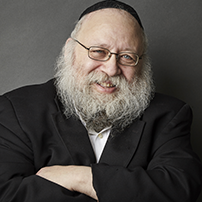
What did Jacob See?
As Joseph’s prediction of a famine that would devastate the residents of Egypt and Canaan came true, Jacob sent his sons to purchase grain in Egypt which ultimately led to the reunification of Joseph with his brothers and his father Jacob.
Thus the Torah states:
“Jacob saw that there were provisions in Egypt: So Jacob said to his sons… Behold I have heard that there are provisions in Egypt…”
Rashi asks, why the Torah begins by saying that Jacob saw that there were provisions, but when he speaks to his sons he said “I have heard that there were provisions in Egypt.”
Second, how could Jacob say that he saw that there were provisions? What did he see and how could he see? And how does that reconcile with the fact that Jacob tells his sons “I have heard” but not “I have seen.”
Rashi answers that he saw with quasi-prophetic vision that there was still some hope [the word for provisions, shever, spelled with the letter sin instead of shin, and reads sever, translates as hope]. Rashi adds that this was not explicit prophecy for he did not know that the reference to hope was to Joseph.
Now the word shever also has a third meaning, its most literal meaning, which is “broken.”
So, we have three meanings to the word shever: provisions, hope and breaking. The Rebbe demonstrates that whenever there are multiple translations or interpretations for the same word there is a relationship between them. What then is the relationship between the word shever as “provision” with “breaking” and “hope.”
To understand the connection, we must preface another question:
If Jacob did not know that the hope referred to Joseph, what other hope could there possibly be in Egypt? And couldn’t Jacob have surmised that the hope did refer to the presence of Jospeh in Egypt. Yet, we know that when he was finally told that Jospeh was alive the Torah states that he did not believe that report. Why didn’t he put two and two together to realize that the hope that he was told about prophetically was indeed the existence of Jospeh?
The following answer is based on the Chassidic work Ohev Yisroel:
Reluctance to Go
When Jacob realized that there was a devastating famine in the land, his sons were reluctant to go down there to purchase food. Egypt had a reputation that it was, as the Torah itself testifies, “the shame of the earth.” Egypt was known for its degenerate and depraved morality. Jacob’s sons were not overly concerned that they would starve, for they had sufficient provisions unlike most others as Rashi interprets the words of Jacob: “why do you make yourselves conspicuous.” Rashi comments: “Why would you show off to the sons of Esau and Yishmael that you have food.” Their fear was the spiritual harm they would suffer.
Jacob therefore assuaged their concern by saying that he saw prophetically that there is hope in the land of Egypt. This means that there is someone in Egypt who is making an effort to crack the evil shell of Egypt. This, of course, referred to Jospeh, but this was not revealed to him. All he knew was that there was at least one righteous person who was making a difference and there was therefore nothing to worry about. Even Egypt was salvageable, and his sons would not be affected adversely by going down there.
We can now understand the connection between two of the three translations: hope and breaking. The hope was that there was a positive influence in Egypt that would break its impurity and make it safe for his sons to go there.
The question remains: what is the connection of the two translations of shever as “hope” and “breaking” to the translation as “provisions?”
Hope and the 10 Plagues
To answer this, we may refer to the gematria-numerical value of the word shever, which is 502. This is the same as the abbreviation of the 10 plagues, recited in the Haggadah Passover night.
[Actually, the Gematria of the 10 plagues is 501, but there is a rule in Gematria that we can add one to the sub-total.]
When the Jews left Egypt, they left with the wealth of Egypt. This is interpreted by the Kabbalists to mean that they were able to extricate the sparks of holiness embedded in Egypt. However, these sparks were so deeply ensconced by the impure shell of Egypt that it took the 10 plagues to shatter the obstructive cover of impurity to finally succeed in extracting those sparks.
In truth, the process of liberating those sparks began with Jospeh becoming the ruler of Egypt but culminated with the 10 plagues.
This then is what Jacob saw that there was someone in Egypt who is initiating the process that will break the impure veneer of Egypt and that will culminate with leaving Egypt intact with all of its spiritual treasures.
We can now understand the connection between the translation of shever as provisions with the translations as breaking and hope. Jacob’s hope was that there was a person who would provide his sons and their progeny with the provisions they will need without being overwhelmed by the impurity of Egypt. In the short run, his sons will return with food with which to subsist and in the long run their progeny will liberate the spiritual treasures of Egypt and take it with them as they proceed to Sinai to receive the Torah, the ultimate treasure and provision.
One can add a slightly different connection between “breaking” and “hope” and “provisions.” The process through which the Jewish people were able to take the spiritual wealth with them come through the bondage they endured. The suffering in Egyptian exile was the crucible that refined the Jewish people and made them eligible to be liberated from Egypt and to receive the Torah.
Jacob saw that the provisions his children will receive would come through the pain and suffering of exile that will bring them great reward; the ultimate reward will be the Torah and the coming of Moshiach. This was the hope Jacob saw.
Shneur ben Rivkah
The story is told that when Rabbi Shneur Zalman of Liadi, known as the Alter Rebbe, the author of the Tanya and the founder of Chabad, was arrested he sent a messenger to his colleague, the Chassidic Master, Rabbi Levi Yitzchak of Berditchev to pray for him. When the messenger arrived, Rabbi Levi Yitzchak asked him for the Alter Rebbe’s mother’s name. The Chassid did not know. Rabbi Levi Yitzchak opened a volume of Genesis to the word shever in our parsha. “Shever,” he said, “was an acronym for Shneur ben Rivkah.”
Chassidim would comment that by connecting Rabbi Shneur Zalman’s name to the word shever, he was intimating that there was hope for his liberation and that his going through the pain (i.e. his “breaking”) was actually the catalyst to his ultimate exoneration and release from prison, upon which the teachings of Chassidus for which he was arrested would be vindicated and would serve as the spiritual provisions of the Jewish people that will lead them to the coming of Moshiach.


